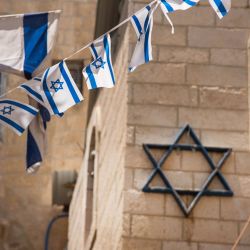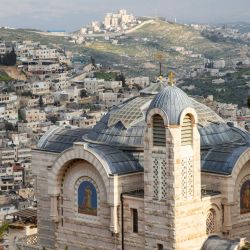In the Christian quarter, we visit archbishop Joseph-Jules Zerey of the Melkite church (a Catholic church which has kept its Byzantine rites). The recognition is immediate:
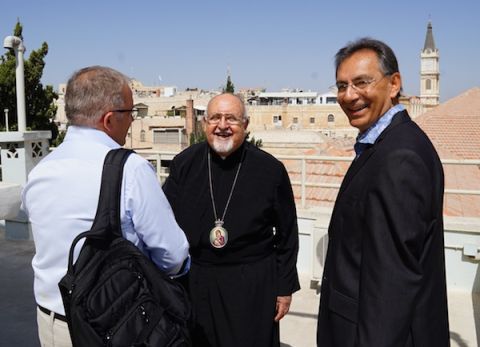
Our division is against nature and the world is suffering because of us. You don't know how much I suffer because of this division. I am thirsty for unity and I pray every day for it. My mother was Orthodox and she used to whisper in my ear: 'Let's pray for the unity of the Church!'.
God's people don't understand these divisions. JJ Zerey sees the cause of them as pride: "It is we, the leaders, who create obstacles. We are afraid of history and of taking steps. Jesus was very hard on pride, especially in the religious leaders."
He dreams of a celebration in the Upper Room where all the leaders invoke the Holy Spirit or at Golgotha without icons and in bare feet.
The diversity of the church is beautiful "like a garden with different flowers", but the leaders must pray together more. When Pope Francis came to Jerusalem, he said, "We must love the Holy Spirit". But he did not have the time to say the most important thing to Him: "Holy Spirit, I love you."
The Christians in Jerusalem are only about 1-2 per cent of the population. What will they be in 2033? To prepare for this event, he insists on the necessity of prayer. Everyone, leaders and people of God, need to pray together. "With everyone, along with the messianic Jews," he added. "I have a huge affection for them."
We then go to visit the archbishop at an Ethiopian monastery near the 8th station of the Via Dolorosa, but he can't see us right now. His secretary introduces us to the church and explains to us from the frescoes the long history of Ethiopians in Jerusalem, beginning with the Ethiopian officer baptised by the apostle Philip.
Being a Creative Presence
After a meal in one of the restaurants in the souk, we go up toward the latin Patriarcat where we wait for Monseigneur Pierbaptista Pizzaballa. Being one of the main leaders of the Fransciscans for more than 10 years, he was recently named the apostolic administrator.
"It is not too far away, but far enough away," he exclaims when hearing about JC2033. "It allows us to walk together. Here we are tired of events and slogans. A huge event must be the conclusion of a walk; if not, we must forget about it."
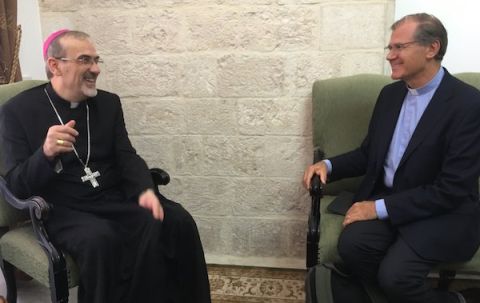 With Mgr Gianbaptista Pizzaballa
With Mgr Gianbaptista Pizzaballa
He invites us to ask ourselves some questions: What is the meaning of the resurrection for me? For our community? What does that change in our relationships?
"For me," he says, "the resurrection must signify a living community, hope that will not perish, belonging to Christ and His body. Today we talk about Jesus without the resurrection. We talk about a social and human Jesus but a Jesus Christ resurrected bothers us. By putting it in the center, our perspective of life changes."
He remembers that the festivities celebrating 2000 years of the birth of Christ were preceded by 3 years of preparation, with people asking for forgiveness.
To prepare for 2033, it is necessary to visit and convince the leaders, but above all, to ask together, in our diversity, what the Holy Spirit wants. In the first phase, all the churches need to reflect on the meaning of the resurrection. Then they must share the meaning with each other since the leaders of the church need know its meaning.
"Young people are looking for where there is life. They don't find it in our churches. It is our presence which needs to call to them. In 2033, may the churches be this creative presence through the witness of our lives."
The Flowering Cross
During the mass in the Armenian cathedral Saint Jacques, I go toward a priest to receive the blessed bread. "Martin?" the Father Emmanuel Atajanyan says to me, handing me a piece of the "lavash" - the traditional armenien bread.
After explaining to us the history of the cathedral and of its people in Jerusalem since the time of the apostles, he brings us into the middle of the Armenian quarter to the inn of the pilgrims.
In a soft voice, but with much authority, he shares with us his convictions about Christian unity. We listen without needing to ask any questions:
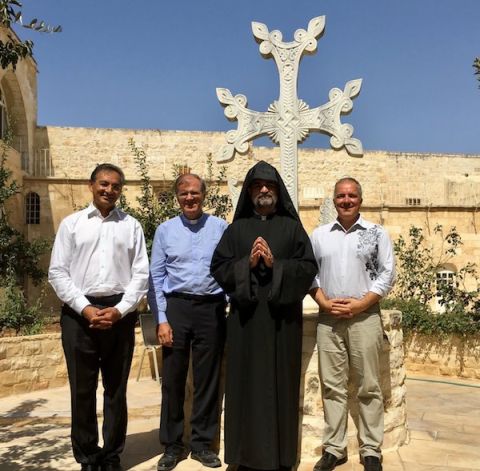
"Certainly we are orthodox and we keep traditions, but we must be open to everyone. If we don't love other Christians, we cannot be disciples of Christ. It is because of my sin that people don't believe. Our churches are often a show rather than an alive church because they don't repent and are persistent in their divisions.
We need saint, prophets and apostles so that we will really repent.
To live in Christ is to live His humility. In Him, we can be really united in spirit. But many betray Him. In the Gospels, it says that few stay with Him. Who is ready to carry the cross and to follow Him until the end?"
Concerning the huge task that is JC2033, he tells us how happy he is to see that we believe in what we are doing. So that we are not tempted by the devil, he encourages us to take some time to retreat to the monasteries.
"I think that we need to stay in contact. Let's pray for one another; we can collaborate! Every year, we need to prepare for 2033."
After 3 hours of speaking with great spiritual intensity and a time of prayer together, we go out into the garden of the monastery where there stands a Kashgar - a flowering cross, a symbol of the Armenian Apostolic Church. With a bright smile, Father Emmanuel explains the meaning to us: the tree-like cross symbolizes the tree of Life in Paradise, communion with God in which Christ lets us enter by His death and His resurrection. A wonderful conclusion to a wonderful encounter!


